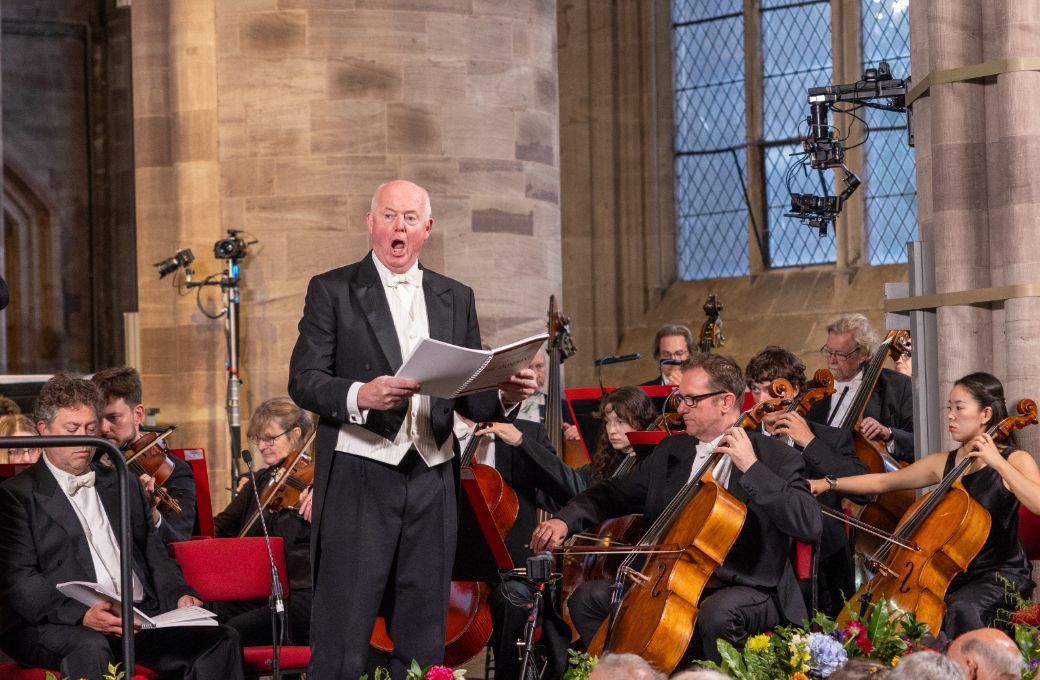We live at a time when concert programmers and record labels routinely dredge the archives for hopefully crowd-pleasing works that have fallen into oblivion. In the case of Samuel Coleridge-Taylor’s passion work The Atonement, the piece was resurrected by the Three Choirs Festival as they themselves commissioned it (in 1903), and to mark the composer’s 150th anniversary year.

The first and most important thing to say is that the performance was superb. The Philharmonia was on typically fine form, the Festival Chorus did what was asked of them – and then some – while the soloists, all six, were genuinely excellent. No problems there.
In hindsight, it’s unfortunate that Coleridge-Taylor gets the work off to such a powerful start. The opening Prelude was seriously impressive in the way it brought together palpable darkness with a highly lyrical sensibility. Blanched by plangent cellos, it conveyed a real sense of fragility from the outset. Not only that, but as it continued there were surprising hints of – of all people – Scriabin (from an Englishman!) in the music’s sinewy lines. Swelling to grandeur at its apex, emerging from gloom into light, this opening boded well, promising a lot.
Sadly, those promises proved false, even making the Prelude seem, in retrospect, a red herring. It swiftly became clear – and perhaps the work’s title makes this obvious – that Coleridge-Taylor wasn’t interested in the reality of the suffering in the narrative. What mattered to him was the outcome, all of the profound positives that the faithful believe emanate from the Roman regime’s casual execution of a local troublemaker.
As such, despite teasing its presence, the work actively shied away from darkness thereafter. We passed through possibly the most (the only?) sumptuous depiction of the Garden of Gethsemane – more passionate than passion – articulated in such a four-square manner that this further undermined its emotive weight. Instead, the music settled into an extraordinarily basic polarised behaviour: politely lyrical whenever anyone was being pious, bombastic when they weren't.
This dismal binary was made more problematic by Coleridge-Taylor’s decision to use the chorus as both narrator and crowd. They immediately took on a schizoid quality, one minute describing the scene with placid neutrality, the next unexpectedly laying into Jesus with makeshift malevolence. Apropos: baritone David Stout (Jesus) and tenor Mark Le Brocq (Pilate) are to be credited for the admirable way they held their own against these onslaughts.
There was, at times, beauty to be found in the music. Being essentially removed from the gravity of the narrative, Coleridge-Taylor went so far as to adopt a Straussian delicacy and elegance later on in the Gethsemene scene. And the work’s high point came in the section focusing on Pontius Pilate, where his wife’s extensive solo – beautifully performed by Rebecca Hardwick – was laden with such strong melodic invention it felt strikingly different from the blander surrounding material.
Yet the back-and-forth of the chorus became not merely predictable but exaggerated, with ever more unctuous grovelling at one end of the spectrum, practically twirling moustaches with evil intent at the other. It was tiring to be subjected to such a dearth of musical and emotional nuance or subtlety, and when Jesus’ death on the cross was prefigured by swooping harp and strings one honestly wondered if the composer was more concerned with creating an entertainment than anything approximating religious expression.
For a non-critical, undemanding audience, The Atonement is a harmless enough way to kill 90 minutes. But for everyone else, Coleridge-Taylor’s bloodless passion is seriously lacking. If only he could have brought himself, and his music, to linger in the darkness.


